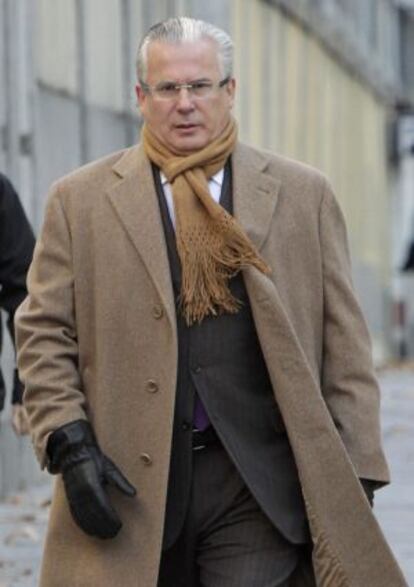Franco-era victims insist on finding out what became of their loved ones
Witnesses called to testify in Garzón trial say justice "has turned its back" on them
"I have no thirst for vengeance but I would like to know the truth." This is basically what four witnesses said when they were called to testify in the trial against Judge Baltasar Garzón on Monday. They explained to the Supreme Court how they felt that the authorities "for the past 75 years have turned their backs" on their repeated quests to find loved ones executed during the Spanish Civil War (1936-39) and buried in mass graves across the nation.
Olga Alcega, who represents an association of families whose loved ones were executed in Navarre and who was first to testify, explained to the seven magistrates on the Supreme Court bench that there are 3,452 people on the rolls in her region who are still listed as missing.
"In Navarre, all those who have disappeared remain missing," Alcega said. "I am the granddaughter of Antonio Alcega ? a mailman who was taking care of his herd when the Civil Guard took him away 74 years ago. They took him to Magallón where they shot him in the head."
As of last Wednesday, a court in Spain has, for the first time, been hearing testimony from the victims ? survivors and family members - of the Republican side in the Spanish Civil War. They have all been called to testify by Garzón's defense team to explain why they wanted the High Court judge to open an inquiry into crimes committed during the Civil War and the subsequent Francisco Franco dictatorship (1939-1975). Garzón's attempt to investigate to help people find missing family members buried in mass graves has put him in the dock on charges of overreaching his judicial duties by opening up the case while ignoring the 1977 amnesty provisions.
Garzón says he only wanted to help people find their loved ones and maintains the 1977 amnesty does not cover human rights crimes.
"Garzón is a victim. What they are trying to do is discredit him," says Henrik Janbell, president of the Harald Edelstam Foundation and one of the international observers at Garzón's trial. The foundation is named after the Swedish ambassador who helped save thousands of Jews from Nazi persecution and Chileans from the Augusto Pinochet dictatorship.
"The image Spain is projecting is one that supports Franco's legacy," Janbell said.
Rafael Espino Navarro, of the Association for the Recovery of Aguilar de la Frontera in Córdoba, has missing family members - including a great-grandfather and a former Socialist councilor -whose whereabouts remain unknown to this day. He says that he asked the High Court to help him find out what happened the 108 people in his town who went missing from July 18, 1936 - the official start date of the Civil War - up to September of that year.
Navarro said that he took testimony from a 98-year-old survivor who witnessed a series of executions. From that account, the association was able to detect one mass grave in 2010 that contained the remains of 55 bodies.

Tu suscripción se está usando en otro dispositivo
¿Quieres añadir otro usuario a tu suscripción?
Si continúas leyendo en este dispositivo, no se podrá leer en el otro.
FlechaTu suscripción se está usando en otro dispositivo y solo puedes acceder a EL PAÍS desde un dispositivo a la vez.
Si quieres compartir tu cuenta, cambia tu suscripción a la modalidad Premium, así podrás añadir otro usuario. Cada uno accederá con su propia cuenta de email, lo que os permitirá personalizar vuestra experiencia en EL PAÍS.
¿Tienes una suscripción de empresa? Accede aquí para contratar más cuentas.
En el caso de no saber quién está usando tu cuenta, te recomendamos cambiar tu contraseña aquí.
Si decides continuar compartiendo tu cuenta, este mensaje se mostrará en tu dispositivo y en el de la otra persona que está usando tu cuenta de forma indefinida, afectando a tu experiencia de lectura. Puedes consultar aquí los términos y condiciones de la suscripción digital.








































